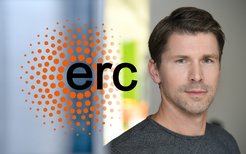Alexander Meissner receives Advanced Grant from the European Research Council
Million-euro funding for the decoding of the cancer epigenome
Alexander Meissner, Managing Director at the Max Planck Institute for Molecular Genetics (MPIMG), has been awarded an ERC Advanced Grant by the European Research Council (ERC). His project is funded with EUR 2.5 million and focuses on decoding the epigenome of cancer using clues from developmental biology.

The epigenetic signature of malignant tumor cells bears remarkable similarities to that of the developing embryo's placenta. Epigenetic information refers to chemical modifications of DNA that do not alter the genetic sequence but instead affect gene activity by tagging modified DNA segments with a read-lock.
“We will use mouse placenta models to learn the fundamentals of what happens early in the tumor,” says Meissner summarizing the project. In fact, almost all cancers involve reprogramming of DNA epigenetic modifications, which is also observed in the early placenta. In both tumors and placenta, regulatory sequences that would typically not be silenced acquire some silencing tags, whereas large sections of the genome usually marked as “silent” lose their marks.
Placenta and many cancers have similarities
Why exactly the two epigenomes exhibit such remarkable similarities remains unknown. However, one plausible explanation could be the biological role of the placenta. The placenta is a crucial organ that is required to grow rapidly and establish new blood vessels while simultaneously suppressing immune system functions.
“The placenta intercepts toxins and can tolerate mutations to a certain degree, which is fine as it is only used for a relatively short period before being discarded shortly after birth,” explains Meissner.
He suspects that given the parallels between placental and tumor tissues, control mechanisms predisposing all cells to activate cancer-like behavior exist even in the absence of genetic cancer mutations. Conversely, this mechanism may hold promise for cancer treatment.
To investigate these similarities, Meissner and his team aim to explore the biochemical, genetic, and physiological aspects of the placenta and cancer epigenomes. “We plan to investigate the specific molecular switches in the epigenome of the placenta, which are likely to also exist in the cancer epigenome. Our self-developed techniques and methods allow us to study these switches at the highest resolution,” explains Meissner.
About the ERC Advanced Grants
In 2023, the European Research Council (ERC) will award 218 Advanced Grants to exceptional researchers across Europe. These grants are highly prestigious and competitive funding programs that enable researchers to undertake particularly ambitious projects. They are specifically awarded to established scientists who have demonstrated significant research achievements over the past decade. This year's call received nearly 1,650 applications, with a success rate of just 13.2%.
About Alexander Meissner
Alexander Meissner, a native of Berlin, Germany, earned his degree in Medical Biotechnology from the Technische Universität Berlin before completing his PhD studies under Rudolf Jaenisch at the Whitehead Institute / Massachusetts Institute of Technology (MIT) in Boston, USA. He then served as a postdoctoral fellow with Rudolf Jaenisch and Eric Lander for a year and a half. In 2008, Meissner began his independent career at the Department of Stem Cell and Regenerative Biology at Harvard University and the Broad Institute. He was promoted to associate professor in 2012 and to full professor with tenure in 2015. In 2017, Meissner became the Director and Head of the Department of Genome Regulation at the Max Planck Institute for Molecular Genetics. He was appointed Managing Director of the Institute in 2019 and awarded an Honorary Professorship at Freie Universität (FU) Berlin in 2020.












